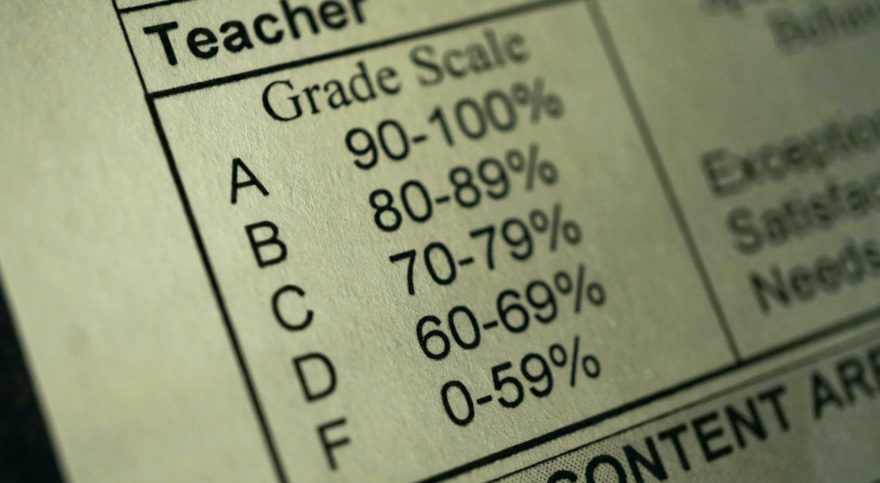- Blog
- > College Admissions
What Is Considered a Good GPA for College?
- Dr. Rachel Rubin
- | March 26, 2020

What is a good GPA for students looking to apply to top colleges? It might seem like there ought to be a simple answer, a single number below which colleges say, “No thanks,” but above which, they say, “Yes, please!” And yet, there are so many variables that go into calculating a high school GPA that such an answer is impossible.
Although almost all schools produce a GPA to represent their students’ academic performance numerically, that number is affected by a range of factors that can differ dramatically between schools. Unlike the SAT and ACT, which are scored the same way regardless of your high school, GPAs can be calculated very differently by schools, even ones within the same state!
That said, GPA is arguably the single most important factor in your college application process, so knowing where yours stands is imperative to figuring out your chances at different schools. Even if you have fantastic standardized test scores, a lower GPA can sink your application. So, how do you know what your GPA means and how admissions officers will view it?
What Is a Good GPA?
GPA stands for “grade point average,” meaning that it’s a numerical representation of the letter grades you received in your courses. Most schools give out traditional letter grades between A (the highest grade) and F (the lowest). Most, although not all, qualify those letter grades with + and – marks, to more precisely indicate how well a student did in the course. Often, those letter grades correspond to percentages, but those percentages are not part of a GPA calculation.
In almost all cases, letter grades correspond to standard grade points: an A grade is a 4, a B is a 3, a C is a 2, and a D is a 1. Plus and minus grades are evenly dispersed within: a B+ is a 3.3, for example, while an A- is a 3.7. For this reason, a traditional GPA is out of 4.0 (the grade point average for getting all As).
However, many high schools produce weighted GPAs, meaning a student can receive more than 4 grade points for an honors or AP class. When interpreting your GPA, it’s crucial to know if yours is a weighted or unweighted GPA.
On top of that, some high schools have additional quirks in their GPA calculations. For example, many high schools are trending toward not including freshman-year grades in the number they print on the transcript. While this may alleviate stress in the short term, you can be sure that colleges will see those grades and take them into consideration.
When in doubt, ask your guidance counselor whether your school uses a weighted or unweighted GPA or if there are any other unique factors you should know about.
What is a Good GPA for High School?
A high GPA is one that’s closest to the maximum grade point average for your school. So, if your school uses an unweighted GPA, you want to be at or near a 4.0, the highest GPA. If your school uses a 5- or 6-point GPA scale, you want to be closer to those values instead.
The average grade for high school students in the United States is around a B, which means the average high school GPA is a 3.0. So, if your GPA is higher than that, you’re off to a good start! At the same time, however, highly selective schools want to see more than “slightly above average,” so if you’re in the low 3’s, you may want to step up your game.
(Note that these national averages may not apply to you, especially if your school has experienced grade inflation in recent years! The average GPA at your high school may be significantly higher than a B average.)
Generally speaking, having high grades means having more As than Bs, which means you’ll come out to a 3.5 unweighted GPA or above. A higher GPA than 3.7 means more As than A-s, while a lower GPA than 3.3 means more Bs than B+s.
Lastly, keep in mind that college admissions officers will see your senior-year grades, so make sure you continue to get good grades throughout the application process!
What Is a Good GPA for Colleges?
With all that said, how do you know if your GPA is good enough for your dream school?
The best colleges, like the Ivy League schools, want to see near-perfect grades, as their acceptance rates are often tied to the academic excellence of their admitted students. With Ivy League acceptance rates being so competitive, achieving As (not A-s) in nearly every class is crucial. When you run the numbers, that means you’ll come out to a GPA of at least 3.9, ideally even closer to 4.0. Admitted students at these top schools sport some of the highest GPAs at their high schools.
Not every college requires you to have a 4.0, however. Schools that are ranked lower by U.S. News get fewer applications and have a lower yield rate, meaning they have to accept more students with lower GPAs and test scores. Nevertheless, even less selective schools like to see more As than Bs and may look elsewhere if they see Cs or Ds on your transcript.
(In addition, applying Early Decision 1 or Early Decision 2 may help your chances, even if your GPA is a little lower than what admissions officers are looking for, highlighting the advantages in the EDI vs. EDII in college admissions process.)
Colleges also care about applicants’ GPAs in their consideration of non-need-based financial aid. Students with high GPAs in high school (along with high test scores) are more likely to receive a scholarship or other form of merit aid from some of their schools. So, not only can a good GPA help get you into your dream school, but it might also help you avoid student loans, too!
Finally, if you’re a college student looking to transfer colleges or apply to graduate school, this transferring colleges guide can help you navigate the process. Like high school, a good college GPA is generally 3.7 or above, and ideally higher in your major classes. Graduate schools in particular tend to weight GPAs more heavily than test scores.
How to Improve Your GPA
So, where does all this leave you? If your GPA isn’t where it needs to be for top schools, don’t fret! While all of your grades will be included in your cumulative GPA (see below), colleges do like to see students who have improved their grades over time.
That means that, even if you have a few duds behind you, you can still put together a strong college application with high grades in your junior- and senior-year coursework. Here are some tips to get you started:
Seek Extra Help
The best way to get higher grades in your classes, and thus increase your grade point average, is to do better on individual assignments! The first step should always be your teacher. If you don’t understand something from the homework or lecture, or you got something wrong on a test or paper and don’t know why, ask your teacher! A good teacher will always make time after school or during a study hall to help you master material that’s eluded you.
If you need additional help, consider getting a subject-specific tutor or a tutor to help with your study skills. Having an expert help you with your homework and give you a study plan for tests can make a big difference in whether you ace the class.
Create A Plan
Sometimes, students feel that they get all the homework problems right and understand lectures, but when they get to the test, they can’t remember a thing! If that sounds like you, you need to start developing a more effective study schedule so that when you arrive on test day, you don’t find that your knowledge has abandoned you in your hour of need.
One idea is to ask your teacher for more problems or even old tests, if he or she is willing to provide them, so you can mimic test-taking conditions at home (no textbook, no notes). Another idea is to study with a friend and practice explaining concepts to one another; in doing so, you may find gaps in your conceptual knowledge of the course material.
Finally, you may need to change your study habits. If you aren’t reviewing all the homework and class problems in the days leading up to the exam, you may be setting yourself up for failure. Find connections between problems, review the problems with which you struggled, and make sure you really understand all the major concepts for that particular unit.
Beat Your Stress
High school can be overwhelming. Sometimes, when we put a lot of pressure on ourselves to perform, we actually end up doing worse. It is, in fact, possible to over-prepare, whether it’s staying up all night revising your essay or skipping classes to do more textbook problems. If you find yourself falling into these patterns, sometimes taking a step back can be the best thing.
That doesn’t mean not studying or revising your papers as needed, but becoming obsessive isn’t a good tactic. Make sure that you’re taking time for yourself when you can, whether it’s going for a walk or run, seeing a movie with friends, or taking a yoga class.
Change Your Schedule
Lastly, if all else fails, consider changing your course load. While colleges like to see applicants who have succeeded in a broad range of rigorous courses, taking too many challenging classes can wreak havoc on your GPA. If taking all Honors and AP classes is going to tank your GPA, then you shouldn’t be enrolled in all so many difficult classes.
In general, take AP classes in the subjects about which you’re most passionate and that relate most closely to the college major or graduate program to which you plan to apply. Don’t overdo it by taking very challenging courses in subjects that don’t interest you.
How many APs is too many depends on the school and the student. Ask yourself how much time you spend on homework and whether you feel stressed or overwhelmed. You want to take as many difficult classes as you can while still maintaining an A average.
Your high school may limit the number of AP classes a student can take. These rules are in place for a reason, but if you feel you can handle more, it’s always worth talking to your teachers, guidance counselor, and/or principal to create the schedule that’s best for you.
How to Calculate Your GPA?
To figure out exactly where you stand, you may want to recalculate your own GPA. To make things easy, we’ll focus on your unweighted, cumulative GPA, so you can more easily figure out where you stand in comparison to students at other high schools and colleges.
First, get a copy of your most recent transcript. You only really need your final grades for each course, but if you haven’t gotten a final grade, you’ll need your semester or quarter grades.
Next, make a list of all your academic classes and fill all the information into this table:
| Column A | Column B | Column C | Column D* | Column E |
| [Class #1] | [Letter Grade] | [Credits] | [Grade Point] | [Multiply Column C by Column D] |
| … | … | … | … | … |
| … | … | … | … | … |
| … | … | … | … | … |
| SUM | SUM |
*To fill in Column D, use the following reference table:
| Grade | A+ | A | A- | B+ | B | B- | C+ | C | C- | D+ | D |
| Grade Point | 4.0 | 4.0 | 3.7 | 3.3 | 3.0 | 2.7 | 2.3 | 2.0 | 1.7 | 1.3 | 1.0 |
Next, multiply each row in Column C and Column D to produce Column E.
Then add up the numbers in both Column C and Column E.
Then, divide the sum of Column E by the sum of Column C.
That will produce a number between 1.0 and 4.0, which is your unweighted GPA!
Final Thoughts
Of course, GPA isn’t the only thing that matters in the admissions process. College admissions officers will also take into account your test scores, extracurricular activities, leadership profile, application essays, teacher recommendations, and sometimes your legacy status when making their decisions. This holistic approach means that there’s no hard cutoff for GPAs at any schools; even a lower GPA can be offset by a strong ACT or SAT score, a fantastic resume, or an outstanding story.
That said, selective colleges also want to accept students whom they know will succeed in their rigorous classes, so they care a lot about GPA. If any one factor is the most important in this process, it’s your academic performance, as represented by your GPA.
Finally, bear in mind that getting some expert advice can help! A good college admissions counselor can help you both understand and improve your GPA, as well as explain what grades you’re likely to need at different schools to be competitive based on the rest of your profile. If you’re feeling lost or overwhelmed, we can help!


